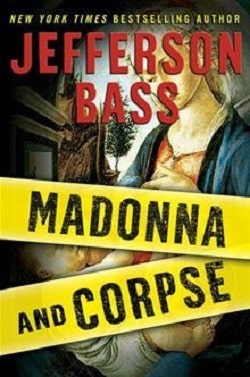Madonna and Corpse, the latest installment in Jefferson Bass's acclaimed Body Farm series, serves as a tantalizing prequel to The Inquisitor's Key. Set against the rich historical backdrop of Avignon, France, this novella intricately weaves together themes of art, deception, and the macabre, all while showcasing the sharp intellect of renowned bone detective Bill Brockton and his capable assistant, Miranda. Bass, a master of forensic detail and narrative pacing, delivers a gripping tale that will captivate both long-time fans and newcomers alike.
The story begins with Inspector René Descartes, a character who embodies the quintessential French detective—intelligent, somewhat cynical, yet deeply committed to his craft. His investigation into a break-in at the Petit Palais quickly escalates into a complex web of art forgery and murder. Bass does an exceptional job of establishing Descartes's character, portraying him as a man who is both dedicated to his work and burdened by the weight of his responsibilities. The reader is drawn into Descartes's world, where the beauty of medieval art contrasts sharply with the grim realities of crime.
As the narrative unfolds, the reader is introduced to the vibrant setting of Avignon, a city steeped in history and intrigue. Bass's descriptive prose brings the ancient walled city to life, immersing the reader in its art-lined streets and historical significance. The Petit Palais, with its medieval masterpieces, serves as a fitting backdrop for the unfolding drama, highlighting the intersection of art and crime. This setting not only enhances the story's atmosphere but also serves as a metaphor for the layers of deception that the characters must navigate.
One of the novella's most compelling aspects is its exploration of the theme of identity. The art forger's studio, a pivotal location in the story, symbolizes the blurred lines between authenticity and imitation. As Descartes delves deeper into the case, he confronts the notion of what it means to be genuine in a world rife with deception. This theme resonates throughout the narrative, particularly as Brockton and Miranda become embroiled in the investigation, forcing them to confront their own identities and motivations.
Bass's character development shines through in the interactions between Brockton, Miranda, and Descartes. Brockton, known for his forensic expertise, is portrayed as a mentor figure, guiding Miranda through the intricacies of the case. Their dynamic is both professional and personal, showcasing a deep bond built on trust and mutual respect. Miranda, a strong and resourceful character in her own right, proves to be an invaluable asset to the investigation. Her growth throughout the story is evident as she navigates the challenges presented by the case, ultimately emerging as a formidable force alongside Brockton.
The plot thickens as Descartes uncovers a charred corpse, leading him to a series of bizarre death scenes that intertwine with Brockton and Miranda's investigation. Bass expertly balances the pacing of the narrative, maintaining a sense of urgency that propels the reader forward. The twists and turns of the plot are both surprising and satisfying, culminating in a climax that is both thrilling and thought-provoking. The author’s ability to intertwine multiple storylines without losing focus is a testament to his skill as a storyteller.
Moreover, the novella delves into the moral complexities of crime and justice. As Descartes grapples with the implications of his findings, the reader is prompted to consider the ethical dilemmas faced by those in law enforcement. This theme adds depth to the narrative, elevating it beyond a simple murder mystery to a reflection on the nature of truth and the human condition.
In comparison to other works in the genre, such as Patricia Cornwell's Kay Scarpetta series or Kathy Reichs's Temperance Brennan novels, Madonna and Corpse stands out for its unique blend of art history and forensic science. While Cornwell and Reichs focus heavily on the forensic aspects of crime, Bass enriches his narrative with a historical context that adds layers of intrigue. The incorporation of art forgery as a central theme is a refreshing departure from traditional crime narratives, making this novella a distinctive entry in the genre.
Overall, Madonna and Corpse is a compelling read that showcases Jefferson Bass's talent for crafting intricate plots and well-developed characters. The novella's exploration of identity, morality, and the intersection of art and crime resonates deeply, leaving the reader with much to ponder long after the final page is turned. With its rich historical setting, engaging characters, and thought-provoking themes, this book is a must-read for fans of forensic thrillers and art mysteries alike. Whether you are a seasoned follower of the Body Farm series or a newcomer eager for an engaging story, Bass's latest offering will not disappoint.
In conclusion, Madonna and Corpse is a testament to Jefferson Bass's prowess as a writer, blending suspense, history, and character development into a seamless narrative. It invites readers to explore the darker side of art and the complexities of human nature, making it a standout addition to the Body Farm series.
























Reviews 0
Post a Reviews: